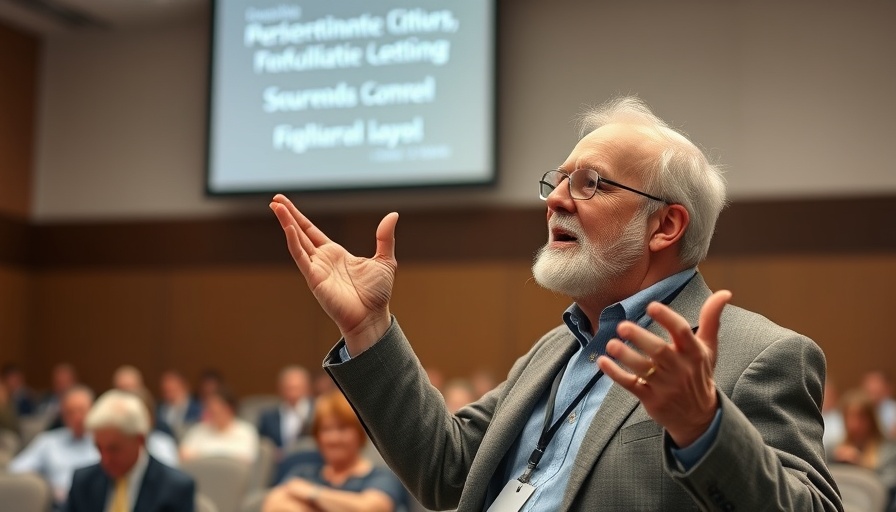
Understanding the Loneliness of Pastors’ Wives
In many churches, there’s a unique and often overlooked dynamic surrounding the wives of pastors and elders. This role, often dubbed the ‘First Lady of the Church,’ carries significant expectations but can also lead to deep loneliness. As discussed in the enlightening video, Pastor, Free Your Wife from Being the 'First Lady of the Church', many pastors’ wives experience feelings of isolation despite possibly being surrounded by church community. This article aims to unpack the challenges these women face, extend empathy, and offer solutions for fostering friendship and support.
In the video, Pastor, Free Your Wife from Being the 'First Lady of the Church', important dynamics around the friendships of pastors' wives are explored, prompting deeper insights on the support they need.
The Loneliness Epidemic
The testimony shared by Kendra, a former multimedia director, resonates with many: several pastors’ wives are feeling isolated and unsupported. The reality is that, while their husbands engage with church activities, these women often find themselves without the same opportunities for connection, creating a feeling of loneliness. Just as congregations support the pastor, it’s crucial to foster an environment where pastors’ wives are encouraged to nurture their own friendships.
Creating Space for Friendship
One of the main takeaways from the discussion is the need for intentionality in cultivating friendships among elders' wives. Pastors must advocate for their wives, acknowledging that they are not merely symbols of authority, but also individuals with their own needs and desires for companionship. Some congregations have successfully created opportunities for mentorship, retreats, and fellowship specifically for wives, allowing them to gather, share experiences, and form bonds. Pastors encouraging their wives to have friends outside of the church hierarchy can lead to a healthier church culture.
Encouraging Authenticity Over Expectations
Pastors and church leaders must be mindful of the pressures that societal expectations place on these women. The narrative of the ‘First Lady’ often reduces them to a stereotype, ignoring their individuality and personal journey. It’s essential for church leaders to emphasize that while their wives might support them in their ministry, their primary role is as individuals whose well-being matters just as much. Enjoyment of true fellowship often comes from shared struggles and common ground, rather than conforming to roles.
Overcoming the Fear of Intimacy
Another significant aspect highlighted is the concern that some pastors’ wives may have about other church members approaching them. They might wonder if others have ulterior motives or if they are simply seeking to gather information about church matters. This perceived barrier can inhibit authentic friendships, creating further distance.
Lessons from Personal Experience
The discussion revealed personal stories from pastors about their own wives facing difficulties. One pastor’s wife described her experience as isolating, particularly during early years of motherhood when she felt burdened and alone. While her husband thrived within the communal life of the church, she grappled with feelings no amount of well-meaning outreach could truly alleviate. It’s a reminder of the need for empathy and understanding in pastoral settings, acknowledging that experiences within the same church can vastly differ.
Offering Support and Solutions
Churches can take practical steps to address the loneliness of pastors' wives. Organizing regular fellowship events, encouraging mentorship programs, and creating informal coffee meet-ups are simple yet effective methods to cultivate an inclusive atmosphere. Moreover, celebrating the unique contributions of these women can help redefine what it means to be a ‘First Lady’—moving away from expectation and toward genuine fellowship.
Conclusion: Embracing an Inclusive Church Culture
The discussions around the challenges pastors' wives face open the floor for broader conversations about creating supportive environments in churches. As community members and leaders, we must work collaboratively to ensure that everyone is valued and included. Encouraging friendships among pastors’ wives is vital; it lays the groundwork for richer community life within the church.
As we reflect on these insights, let’s continue to encourage open, non-judgmental support networks for pastors’ wives—allowing them to be themselves rather than just a title. This includes granting them the freedom to foster relationships rooted in mutual understanding and respect.
 Add Row
Add Row  Add
Add 








Write A Comment